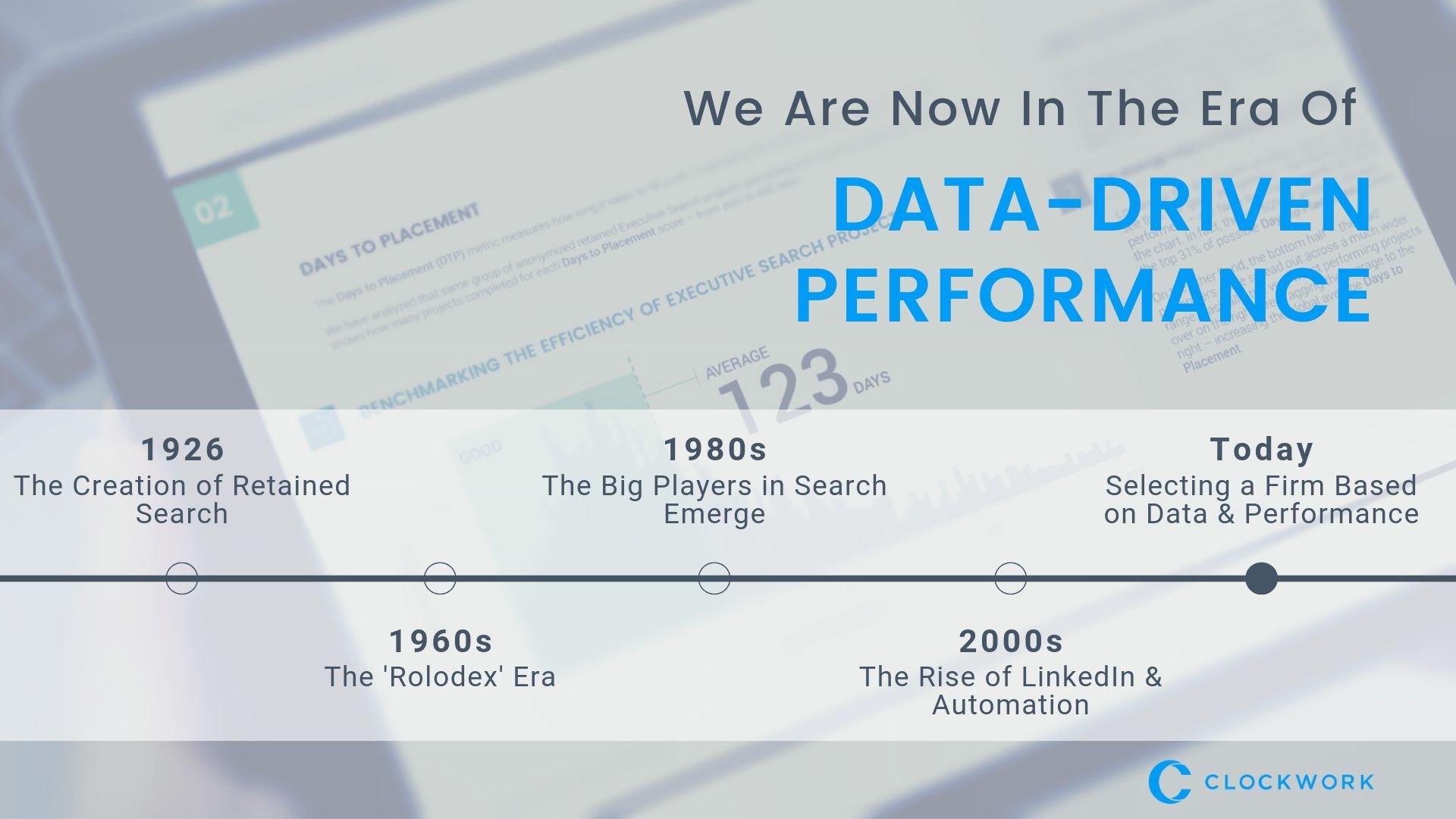A Brief History On Selecting An Executive Recruiter
The Creation of Executive Recruiting
When it comes to the creation of Executive Recruiting as an industry, we can look back to Thorndike Deland's firm created in 1926. Thorndike Deland Associates is credited as the first retained executive search firm in documented history dedicated to finding executives in the retail industry. The concept of executive search, however, has a much deeper rooted history.
Originally, executive search came about as a result of management consulting. What was once the norm to promote internally, transitioned into hiring experienced executives that usually only skilled consultants had the ability to find. As a result, executive search was formalized into the dedicated service that we consider it to be now.
While the fundamental principles that an Executive Recruiter uses haven’t changed over the years, the buying process—how a company chooses a recruiter—has.

1960s: The ‘Rolodex’ Era
Thus, when a company needed help finding a key hire, they would retain one of these new search consultants. Early on, finding one of these consultants was done strictly through referrals, often through the management consultant you were already working with or through word-of-mouth from a colleague. Over time these consultants grew from independent operators into the retained search firms of today.
In its day, the referral from a management consultant was reasonably sound. After all, they work alongside you so they should have a base knowledge of your company and the requirements for the role you're looking to hire. Word-of-mouth referrals on the other hand often varied in quality.
Now, one thing to keep in mind is that specialization is crucial for key hires. For example, finding a VP of Operations for a Manufacturing Company in Ohio is much different than a CEO of a Retail Company in New York. It soon became apparent that just because a firm did well on your colleague’s project, doesn’t necessarily mean they would do well on your project.
Also around this time is when industry organizations would start to pop up in the executive search industry. These organizations quickly became another way for companies to find Executive Recruiters if they didn’t otherwise have a referral. However, these directories at best indicated where the recruiter was located, not their specialization.
1980s: The Big Players Emerge
Over time the popularity of Executive Recruiters continued to grow and some firms grew to become quite large. Size in particular is a pivotal factor to note since a retained search firm’s value in their offering was largely dependent on the size of their candidate database. With this in mind, mergers and acquisitions to pool candidates became a common practice. This approach eventually built nationwide recognized brands in the industry, some of which are still in business today.
The perceived advantage to buyers was straightforward: surely if anyone could find the right hire, the biggest firm in the country could. Indeed, in some situations, going with the biggest firm was seen as a way to cover one’s accountability if the hire didn't work out.
On the other side, the large firms also had a tendency to shift towards being generalists. They would take on any project regardless of seniority, department, industry, company size, or location. As mentioned above, specialization is key and the most successful large firms are careful to manage what areas of specialization they have and ensure they have the Executive Recruiters with the specialization to cover those areas.
Although there is value in a large candidate database, there is also much more to the executive search process than a database query. For one, attracting a gainfully employed executive to leave his current company to join yours is not easy. An Executive Recruiter that specializes knows how to position your role and the opportunity.
2000s: The Rise of LinkedIn & Automation
LinkedIn and other recruiting tools helped to ‘democratize’ the candidate database that the large firms possessed.
On the one hand, the promise here was to ‘level the playing field’. By having access to tools like LinkedIn and AI, a recruiter can access a larger talent pool and do a better job at finding exactly the right candidate. For the buyer of executive search, it would seem your best bet is to hire an Executive Recruiter that leverages these technologies. On the other hand, these tools also represent an opportunity for companies to conduct a search on their own.
The problem with both is that there’s much more to executive recruiting than just research or sourcing. Before the sourcing even begins, a strategy must be created in conjunction with you based on the candidate you're looking for. After research commences, a recruiter then needs to think about the best outreach strategy to contact potential candidates. Subsequently, a deeper analysis must be conducted in the assessment stage so the recruiter can prepare their client to make a final decision.
Many of these tools really just try to solve the candidate research problem the large firms from the 1980s tried to address. And because there is much more to executive search than just research, buyers of executive search continued to rely on either a referral, an industry organization, or the brand of a large firm.
However, it's also at this time when a new option for selecting an Executive Recruiter emerged: Google. Like many other service based industries, 'Googling it' became an option. The advantage is that you can get very specific with the search query, specifying the specialization you need, e.g. 'best CFO recruiters in New York'. However, the quality of the results can vary widely. There is no vetting that they do the type of search work you need and have done it successfully. A key hire for your company is not something you want to leave to chance.
Today: Selecting a Firm Based on Data & Performance
Today is the dawn of a new era in selecting an Executive Recruiter. A key hire is a crucial investment in your company’s future success. Likewise, properly engaging with an Executive Recruiter is a costly endeavor and a big time commitment. You can’t afford to get it wrong.
Companies today know that a referral might not be the right fit for their specific hire. They know that picking a name off a directory is like using the Yellow Pages: you don’t know what you’re going to get. They also know that a good brand doesn’t necessarily equal good work for their specific search. And they know that, while Google can present a list of Executive Recruiters, they haven't been validated with performance data.
Buyers today want Executive Recruiters that specialize in the exact hire they’re trying to make and they want to be certain they are the best at it. There isn't time or money to waste on getting it wrong.
That’s what our Find-A-Recruiter service does. We take your specific criteria, recommend Executive Recruiters with the best track record of completing those projects fast, and help you make a selection to jumpstart the search for your key hire.

.png?width=50&name=Christian_Spletzer%20(1).png) By
By


